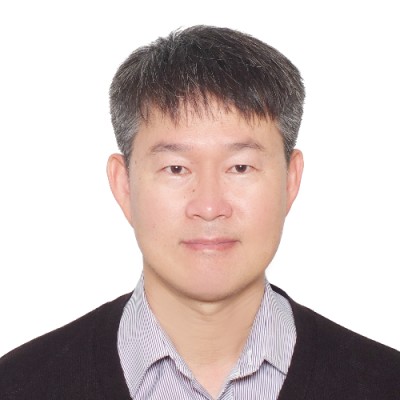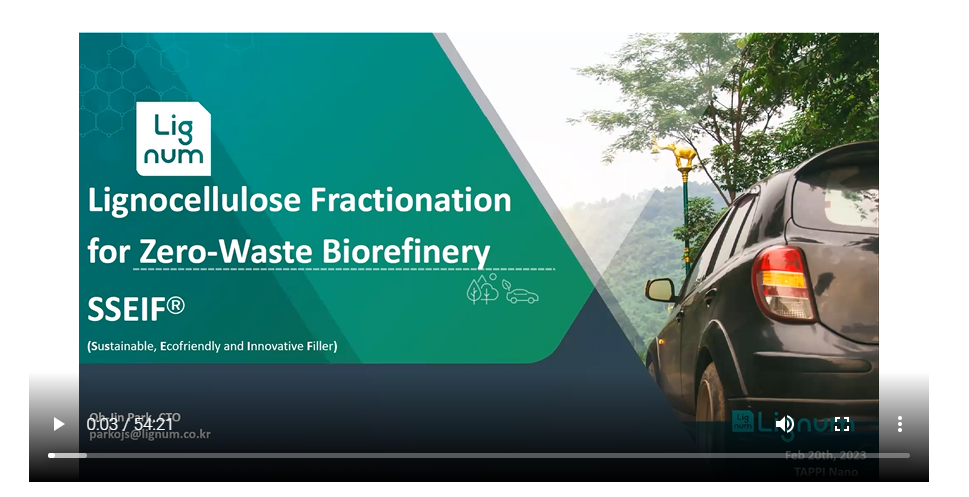 Lignocellulose Fractionation For Zero-Waste Biorefinery
Lignocellulose Fractionation For Zero-Waste Biorefinery
The urgent need to accelerate the transition toward a world beyond fossils and circular bioeconomy requires the development of biorefineries with different chemical trees from fossil-based ones. Lignin-first biorefinery demonstrated by Lignum, a start-up in South Korea, will be introduced along with their activities in developing biobased fillers and valorization of sugar streams from the biorefinery. Application of SSEIF® in thermoplastics in automotives, rubbers & elastomers, electrical cable compounds, 3D printing filaments, and biodegradable agricultural mulching films are a few of examples where SSEIF® will make differences. In this presentation, the characteristics of SSEIF® and its applications will be discussed from the perspectives of various applications of biobased fillers.
Who Should Watch?
- Scientists
- Engineers
- Graduate Students working and interested in Lignocellulose Fractionation Technologies and Application of Biomaterials from Wood Residues
Speaker - Oh-Jin Park

Oh-Jin Park, biochemical engineer, studied biochemical engineering at Korea Advanced Institute of Science & Technology (KAIST) from 1987 to 1997 (advisor : Prof. Ji-Won Yang). He performed postdoctoral researches at Institute of Food Research (Reading, UK with Dr. Evgeny Vulfson and Department of Chemical Engineering of Rensselaer Polytech Institute (Troy, NY with Prof. Jonathan Dordick). Returning to Korea he worked at a startup company, Enzychem, and conducted research on improvement of enzymes through directed evolution at Department of Life Sciences at KAIST with Prof. Hak-Sung Kim, where he employed biocatalysts (hydanoinases) to synthesize unnatural amino acids. He joined LG Chem where he participated in the development of enzyme-catalyzed processes for synthesis of agrochemical and pharmaceutical intermediates. He also participated in the industrial biotechnology research program at LG Chem R&D Park.
Inside this Section
- TAPPISAFE
-
- Assessing Dryer Performance Using TAPPI TIPs - II
- Biomaterials and Bioethanol from Lignocelluloses
- Grade Change Transition Performance and Troubleshooting
- Understanding Bulk and Surface Properties of Complex Solid-State Materials Through Vapor Sorption Techniques
- Enhancing and Expanding Wastewater Treatment at Pulp and Paper Mills Webinar
- Exploiting CNF Water Interactions in new Applications
- TAPPI NANO Webinar Series - Wood Nanoscience and Nanotechnologies
- The Promise of AI Versus the Reality of AI Today
- Chest and Tank Cleaning Tune-Up in the Pulp & Paper Industry
- Insight into Lignin-Based Materials Webinar
- Nano Webinar: Protein Amyloid Fibers and Interactions with Nanocellulose
- Increasing MTBR for CI0₂ Applications in the Pulp & Paper Industry
- How Deep Learning is Used to Determine Woodyard Chip Size Webinar
- Cellulose Nanocrystals in Cementitious Systems – Pilot and Commercial Scale
- Production and application of micro-fibrillated cellulose for paper and board
- Progress Of Nanocellulose And Its Application In China Webinar
- Improving Cross Direction Mapping Webinar
- SCOPE: How to establish and control a successful project
- Nanotechnologies to Advance the Carbohydrate-based Society
- Why Inline Color Measurement is Critical for Paper Manufacturers
- Increase Process Uptime and Efficiency with Power Ultrasound Technology
- Circular Packaging Products from Polysaccharides
- Innovating Renewable Materials for the Future
- Benefits of Duplex Stainless Steel for the Pulp and Paper Industry
- Nanocellulose Sustainable Isolation and Advanced Applications
- Total Pulp and Paper Mill Energy Evaluations
- Integrated Plant and Personnel Safety Solutions for Pulp and Paper Mills, Converting, Printing and Packaging
- The Evolution of Reel Statistical Methods
- Paper Machine Conversions – Feasibility and Conceptual Engineering Phases
- Packaging Solutions: A Conversion Checklist – Technical Considerations for Conversion to Packaging Grades
- How to Keep Advanced Process Controls (APCs) operational longer than 24-months
- Papermaking Industry 4.0: How to Get More Insight from the Data You Already Have
- Troubleshooting Fluid Sealing in Pump Systems for Safety and Reliability
- Data Governance as the Backbone for Data Value
- Paper Machine Water Efficiency
- Improve efficiency with a water management model that maximizes asset utilization
- Coating and Graphic Arts Virtual Event
- Making the Most of Every Fiber
- The Future of Manufacturing Execution Systems: Towards Autonomous Mills
- Current activities in measuring size distributions of Cellulose Nanomaterials
- How to make sure your process improvement project lives on
- Energy Savings & Runtime Extension Strategies For Recovery Boilers
- Papermaking with nonwood fibers
- At the Heart of the Pandemic Response: An Overview of Meltblown Mediafor PPE
- The Benefits of a Risk-based Pressure Vessel and Storage Tank Inspection Program
- Sustainable Fibers for Nonwovens
- Flash Mixing Wet End Additives
- The Science Behind Energy Efficient Homes
- Do We Need an Industry 4.0 Lexicon?
- Personnel Protection Using Textile Substrates Webinar
- Best Practices for Building Ventilation Improvements and Efficiency
- Thermocompressor Applications in Paper Drying (TIP 0404-66)
- Time Management: Smart Techniques That Help You Become More Efficient
- Unconscious Mistakes Women Make That Sabotage Their Careers
- Work – Life Balance: Elusive Dream or Achievable Goal
- Labeling Strategies for Cellulosic Materials
- Moving Past Generational Differences
- Monitoring Tools and Strategies for the Detection and Control of Microbial Growth in Papermaking Systems
- Modern Hydraulic Headboxes - Managing Expectations and Operations
- Microbially Influenced Corrosion
- Microbial Control Protecting Mineral Slurries and Papermaking Additives from Spoilage
- Machine Thermal Sprayed Yankee Dryer Coatings
- Introduction to Tissue Creping and Creping Chemistry
- Introduction to Nonwovens Processes Part I
- Introduction to Nonwovens Processes Part 2
- Increasing Paper Machine Agility with a Novel Grade Change Concept
- Improving Sustainability with QCS Life Cycle Management
- How to Deal with Misleading Environmental Claims Related to Print and Paper
- Evaluation of LLDPE Sealants and Structures for Ultrasonic Sealing
- Transforming Cellulose Nanocrystals into Sustainable Products through Surface Engineering
- Tissue Softness Explained
- Spray Nozzle Basics for Papermaking
- Preventing Dissolving Tank Explosions
- Paper Quality Measurement – Past, Present and Future
- Paper Machine Vacuum Systems
- Nanotechnology in Fibrous Materials: 101
- Nanocellulose: The Road to Commercialization - Opportunities and Recommendations for Researchers, Producers, and End Users
- It is not a question of IF: Digital Printing for Corrugated Packaging Part II
- It is not a question of IF: Digital Printing for Corrugated Packaging
- Introduction to Emulsion Polymers
- How to Use Rheology to Characterize and Formulate Nanofiber Based Materials
- High performance cement via cellulose nanocrystal addition
- How to Specify Showers and Nozzles to Maximize Productivity
- Flame Retardant Formulations, Testing and Environmental Concerns
- Cellulose Nanomaterials: Measurement Needs and Potential Solutions
- Biofilm Control in Papermaking Webinar
- An Overview of Principled Centered Safety
- Drying and Profiling Efficiency of Steam Profilers
- Corona and Plasma Surface Treatments The Opportunities
- Combat Process Disturbances and PID Loop Interactions
- Boost Mill Wide Productivity with a Common Language Approach
- Biocides in White Water Systems Maximizing System Performance While Minimizing Costs
- Binders - Latex Butadiene-Based Latex Binders
- BEAM-- A Model to Assess Biomass Energy Availability Transport Options and Delivery Costs
- Process Foam What Why and How to Attack
- Paper Machine Centrifugal Cleaner Systems A Brief Tutorial
- Nanocellulose based materials for barrier and antibacterial packages
- Microbes in Fresh and Recycled Water Systems
- Overview, Properties and Opportunities for Nanocellulose
- Nanocellulose in the Formulation of Emulsions and Formulation-Composition Maps
- Microbes in Papermaking: Do You Have a Problem
- Improving Winder Safety
- Cellulose Nanomaterial Commercialization: an End User Perspective
- Better Mill Decisions Through Detailed Grade Cost Analysis
- Basics of Refining
- Advanced Online Process Analyzers for Pulp Mill Control
- A Comparison of the FSC and SFI Forest Certification Standards
- Modern Energy Strategy for Paper and Pulp Businesses - Securing a Prosperous Future
- Science, Politics and the Ever-Changing Workplace Regulation of COVID-19
- Understanding Wireless in Process Manufacturing
- Power of spectroscopy for chemical recovery and stickies monitoring Webinar
- Four Ways Packaging Manufacturers Use IIoT to Solve Their Biggest Challenges Webinar
- HCl Gas: A Versatile Catalyst for Retrieving Nanocellulose and Sugars form Biomass
- Improving Fiber Quality and Reducing Chlorine Use in Paper Repulping. Oxone™- The chlorine-free repulping aid
- The Future of Refining
- Data-Driven Decision Making with Process Analytics - Making sense of big data in the pulp and paper industry
- Transducer Basics - Proximity Probes and Other Sensors Webinar
- MFC Robust Grinding Modules & Wet End Jet Applicator—A Path to Disruptive Advantages from Biomaterials
- Nanocellulose-Mycelium Hybrid Materials Webinar
- Lignocellulose Fractionation For Zero-Waste Biorefinery
- A Foray into Feedforward Control Webinar
- Recent Development In Nanocellulose Researh At RISE
- Approach Flow Screening - Impact on Capacity, Stock Cleanliness, Fiber & Energy Savings and PM Runnability Webinar
- Advanced Inline TDS Measurement Technology for Brown Stock Washing Optimization with Advanced Process Control Webinar
- Are you ready for the next level in quality control? Webinar
- Designing Plant-Based Functional Materials Towards Carbon-Negative Applications Webinar
- Spray Transfer Efficiency Webinar
- Fibenol – Wood Residues into Sustainable Bioproducts Webinar
- YP Open House with Coating & Graphic Arts
- Superior Drying Efficiency in Steel Dryers Concept
- Machine Health for Pulp and Paper
- Molded Pulp, Chemical Aspects Webinar – Part 1: Retention and Uniformity
- Molded Pulp, Chemical Aspects Webinar – Part 2: Fluid holdout (hydrophobic sizing)
- Paper Solutions for Food Packaging Webinar
- Molded Pulp, Chemical Aspects Webinar Part 3: Strength Attributes Webinar
- Molded Pulp, Chemical Aspects Webinar Part 4: Dewatering Challenges & Strategies
- How We Turned a Static Optics FTIR Spectrometer into a Universal Analyzer for Pulping
- Molded Pulp, Chemical Aspects Webinar Part 5: Runnability and Process Efficiency
- Using Industry 4.0 Tools to Maintain Maximum Sheet Consistency Out of the Press Section
- Roll-to-Roll Processing of Nanocellulose into Barrier Coatings Webinar
- Solutions for Bearings in Paper Machines Webinar
- Efficient Production of Bio-Based Ingredients
- Best Practices for Consistency Measurement
- Surface Engineering of Cellulose Nanocrystals for Sustainable Bioproduct Development
- Use AI to Give Junior Operators the Performance of Experienced Staff
- How do I access My eLearning
- Training Catalog
- Paper Machine Operator Training Standard-FREE
- TAPPI Professional Certificates

